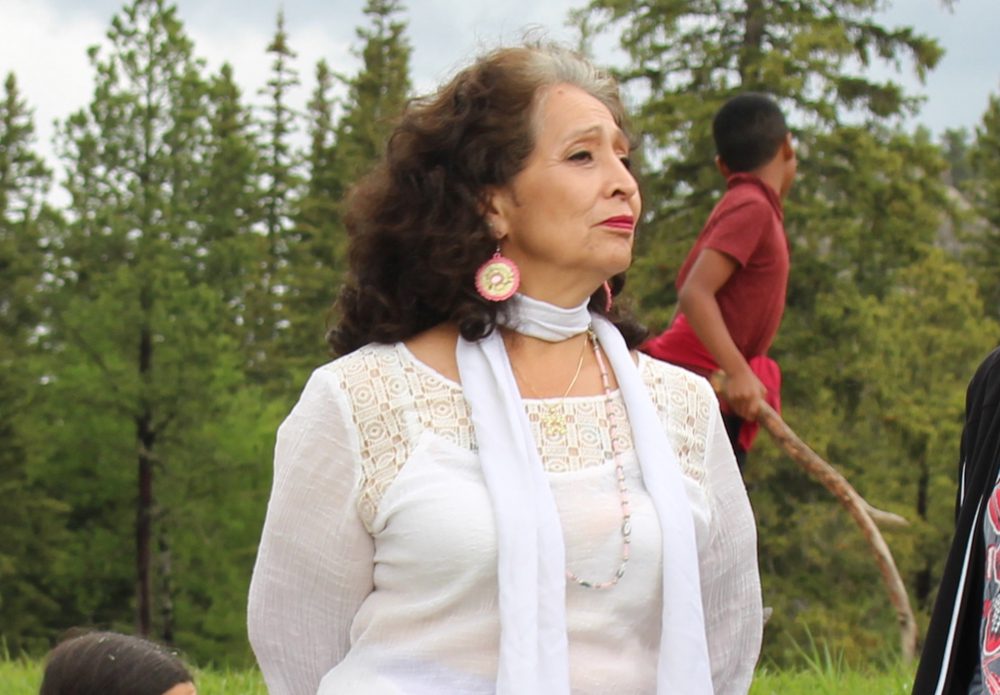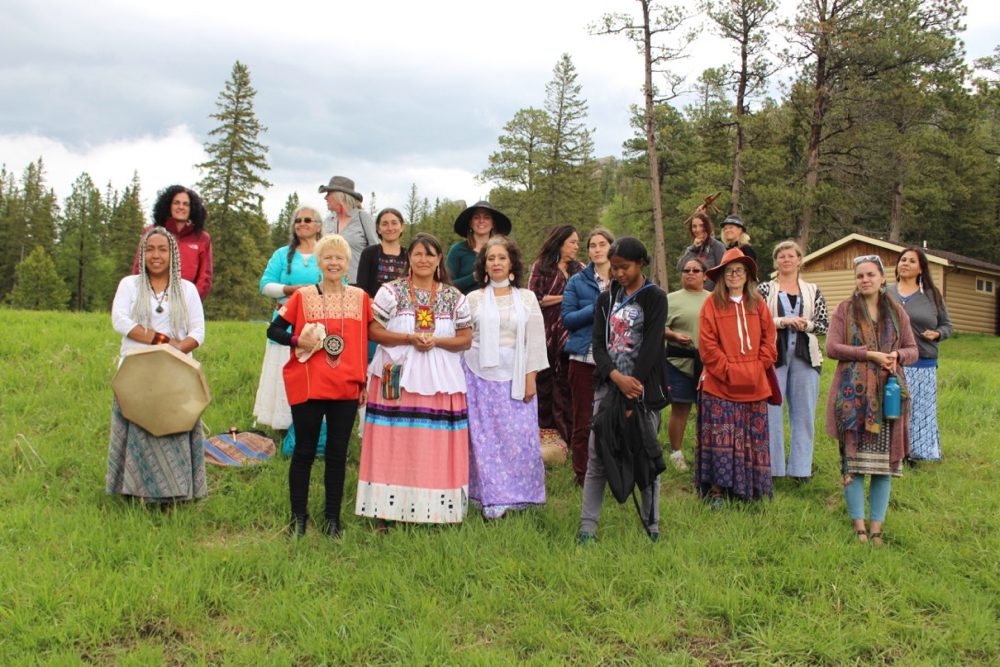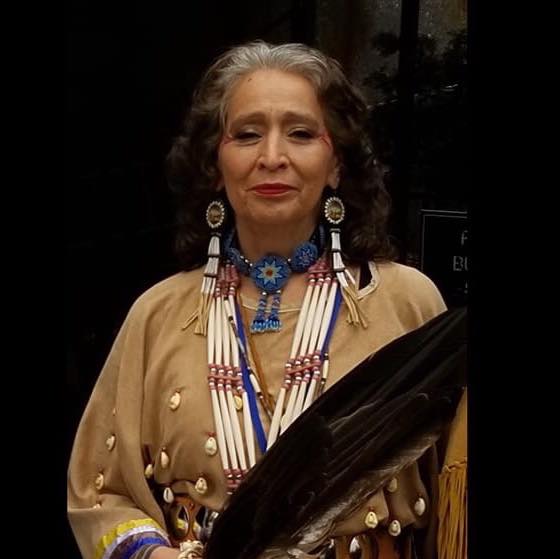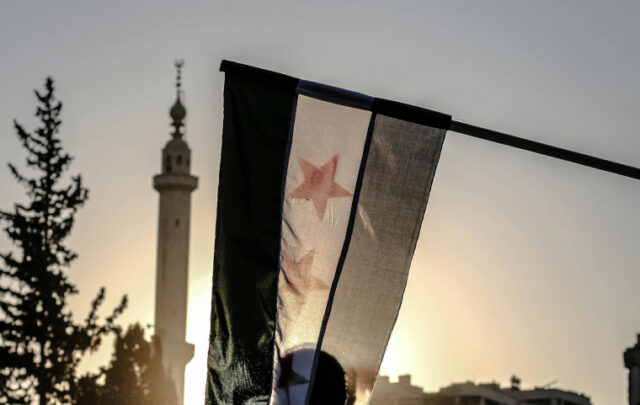In the harrowing days of the Standing Rock resistance to the Black Snake, LaDonna Brave Bull Allard — Tamakawastewin, or Good Earth Woman — became an icon, though she’s quick to step away from such titles with her self-deprecating humor. The Lakota historian’s fight to stop the Dakota Access Pipeline from plowing past her son’s and her husband’s grave and under the Missouri River became the rallying point for a movement. And while the pipeline eventually prevailed, the seeds planted there have been quietly sprouting and growing at Sacred Stone — the resistance encampment that she founded, and the community that has sprung up in the wake of the encampments — and in water protector movements around the world.

Things are much quieter these days on the Standing Rock Reservation, but LaDonna continues to make her voice heard, from Mauna Loa to Portugal, as she speaks out for a way of life that honors the Earth. We were honored to catch up with her in Pe’Sla, at the heart of the sacred Black Hills of South Dakota, during the recent Sovereign Sisters Gathering. In Part I, the reflections she shared with the group provide plentiful food for thought. Coming soon, Part II, an interview with LaDonna on Sacred Stone Village, climate change and more.

LaDonna Allard at Black Elk Peak, Sovereign Sisters Gathering, June 2019 (Tracy L. Barnett)
My name is Tamakawastewin. I’m so honored to be able to be here at the Heart of the Nation, the Heart of the World. Each indigenous people takes care of a part of the Earth and that is our responsibility. Those are the original teachings. So here we are, at the center of the world – Pe’ Sla.
I think all of our history – good and bad, and whatever we learned – things happened the way they’re supposed to happen. There are lessons for us to learn. And for Pe’ Sla, we had to learn how precious this was, it had to be taken from us so that we could have it back again. And it was a process. So this land here is precious. I want to start out by saying that. Because this land, Pe’ Sla, can heal. And I don’t care who you are or where you come from, we all need to heal. Every day, everything that’s happening around us, we need to heal. And so this is a place of healing. People came here for thousands of years for that healing. Now we are so honored to be able to be here.
I find that as a great joy. It’s like when you pull up in a car and you have to put your hands out because – Oh, my God! We’re here, at the Center of the World. It is precious.
With that, I want to make sure you guys understand. I don’t know nothing, I don’t do anything, the only gift I have is I come from a long line of big-mouthed women and I have a big mouth. That’s it. (laughter)
Every day it’s the young people who teach me. They say, “Oh! Standing Rock!” I didn’t do anything at Standing Rock. I picked up garbage – yes. But it was the young people who showed me, who taught me, who were the strength – and I don’t want anybody to ever forget that. It was the young people who taught me Instagram, Twitter, Facebook, Live Feeds – it’s the young people who taught how to spread the word. It’s the young people who taught us how to stand again. It was the young people who brought that empowerment to the people.
If you were there at the beginning of the camp and you saw these young people sit down and strategize and talk, and now you see all these young people who are standing up everywhere – it is them that we should be acknowledging. It is these voices that these young people have.
And so I try to listen because they’re there to teach me lessons. So I want to say that right up front because they’re just such amazing young people.
A powerful compilation byJaguar Bird including LaDonna’s heartbreaking history of the Standing Rock Sioux tribe.
I don’t know anything but I do know how I grew up.
I grew up with my grandmother living on the Cannonball River. We grew up hauling water from the river, we lived off the land. And I know that’s a good way to live.
I tell people that our first act of sovereignty is food. Our first act is taking care of self. So no matter what we do, if we’re not taking care of self, we’ve already failed.
And so – ask the guys at home, they’ve been planting everywhere, putting food everywhere – because we must feed ourselves.
When did we as a people lose that self-empowerment? When did that happen? When did we wait for a government to tell us whether or not we could have health care? When did we wait for them to feed us, to go to a grocery store? When did that happen?
When did we wait for laws and policies to be created so that we could have a community? When did that happen?
All of a sudden, we’ve given our power over to an entity that doesn’t deserve our power. We must take back that empowerment of self. We must take back our own health care. We must take back our own food. We must take back our families. We must take back our environment. Because you see what’s happening. We gave the power to an entity, and the entity is destroying our world around us.
I tell people that when you want to talk about finding balance – we already knew that. We put our hands and our feet on the Earth and it heals us. We already knew that.
We know when we’re planting or gathering on the Earth, it heals us. That is why we didn’t have depression or all of these other things that people have – because it was always here. And then all of a sudden they took us away from there, and then all of a sudden we started having all these issues. And I tell people, we need to go back to here (touches the Earth). We need to go back to the respect for the Earth – because it is the first Mother. It is the first one that came to give us life.
I don’t understand why we don’t respect that anymore.
Why do you want to cut down a tree when you know the tree makes oxygen? Oxygen helps us breathe. Why would you do that? Why would you destroy the water when you know we are made of water, and we need water to live? Why would you do that? So I have a hard time with a lot of things that I’m seeing going on right now on the Earth, because logic is: We care for the water, we care for the Earth, we care for our animals, we care for the insects, we care for all the things around us, and then everything stays in balance, and then we are in balance.

Chery Angel and LaDonna Allard at the center of a group of women from the Sovereign Sisters Gathering on pilgrimage to Black Elk Peak.
Somewhere along the line, we lost self-empowerment.
Somewhere we gave our power away. And I just ask people, go to the Earth and grab it, pull it up. Empower self. Because when you empower self, you have compassion for fellow man, you can have compassion for each other.
Our first act of community is eating together. Feeding people. I don’t have any other obligation in my life; I’m old now. My obligation is to feed people. At camp, that’s all I did. Make sure everybody had food – because that’s what I know how to do. It is a healing mechanism to eat together. Somewhere we fell apart in our communities so people have these little houses and they all eat by themselves and they’re all lonely — and it’s creepy. When we should all be eating together, we should all be sharing, we should all be having fellowship.
When I was a child, living in a community, everybody went visiting. Grandma would say, ok, we’re going to go visit. But we didn’t visit for one, two hours; we’d spend maybe two or three days. So we’d get all ready and we’d go. And Grandma would make us all go to the wash basin and she’d say, “Eat some bread! Because when you go to the house, the people will give you the best that they have – and they don’t have much. So don’t be a pig.” That’s how Grandma used to talk to us. (laughter.)
And she’d say, “And clean your dishes, and sweep their floor, and get them wood, and when the adults are talking, don’t you kids be standing around the table.”
So we’d get these lectures, and then we’d head out.
And all us kids would play, and then we’d head home, and then Grandma would say – you know, we were talking. And so-and-so said, you know that woman with all those children? They don’t have any food. So we’re going to bake bread, and we’re going to take bread to them.
And did you hear so-and-so is fighting with his wife? And all the grandmas load up, and they make the husband and wife sit down, and they lecture them.
So-and-so’s son is misbehaving. So they go over there… A long time ago, when we talked, it was about, how do we heal a community? How do we help each other? How do we feed each other, how do we care for each other?
When our society turned upside down – which is the way it is now – now when we speak, we speak from pain, to hurt, to cause dysfunction. It is because in our homes, bad things are happening, so we don’t want anyone to know. So now we’ve got to take that and put it back up the way it was – to actually care about each other.
Which is really hard when you’re in the city.
I had the misfortune of having to stay in New York for three weeks (laughter). And me and Moisés – we were just kind of out of place there. Because Moises – he’s from the Sierra Nevada of Colombia, way up in the mountains – he’s Kogi. So me and him, we couldn’t talk to each other, but we’d be going around and he’d say – these people live hard in the city. And I said, Yeah, look!
We leave the place where we’re staying, we get on the bus, and the bus would take us to a train, and then we’d take the train and they would take us down to – I said hell. And we go down the stairs, all the way down, and there’s a subway down there, and we get on the subway. And then these guys get on there and we’re all squished like this, and then when we get out, then we have to climb all the way back up. And then you’re in the middle of a great big city, and there’s no trees and no birds singing, and it’s just kinda creepy. And people walk like this and they don’t look at you and they don’t smile. And Moisés said – these people live strange. And I said, Yeah, they do. They’ve got no Earth to touch.
So we had a lot of fun – even though we couldn’t talk to each other, our translator was looking at us – because it was really hard for us to not have that connection. So you go in this city and they have all these sidewalks, and they have these little squares with dirt and trees in them. So he took off his shoes and he put his foot in the dirt and I said don’t do that, Moisés! That’s where all the animals do their… (laughter) Strange stuff in cities!
My point is, in the cities, people are really lost right now. They have forgotten their connection to this (touches the Earth). They have forgotten what it is to respect water. People go and they turn on a tap – they never think about it. It never crosses their mind. And for us right now, we are entering the season – this is the season in our country where our people make the commitment to go without food and water for four days. And I tell people, when you do that every year, and you make that commitment, by the third day, all you can do is dream about water. How precious that water is; the taste of that water. You can smell that water. It becomes an obsession – because without water, your body starts dying on that third day. To be able to taste the first taste of that water – it’s so refreshing. Do not forget. So every time you see that water – Mni Wiconi – you say a prayer. You give thanks for that water.
And I think that’s one of those things we’re missing. Respect. Respect for the Mother Earth, respect for the water. If you can respect these two, then you can respect the birds; the songs they sing. The insects – even the mosquitos that bite you – all of the things have a purpose in this world. And I think we are lost in cities, and it was very frightening to see people so disconnected. And so we are privileged – and I never thought of that before, because in Indian Country we’re poor; you never know what’s going to happen there. But we have this (touches the Earth). We have this connection. We have this love of this Earth.

LaDonna Allard, left, with the author (center) and Sacred Stone Village resident Josh Diaz at Bear Butte, one of four sacred sites in the Black Hills where the women traveled to pray during the Sovereign Sisters Gathering.
I was talking to some environmental groups and they said, how did you guys gather all of those people to do this? We’ve been doing environmental stuff for 40 years.
And I said bad things to them. I said, You don’t love the Earth. You love a cause. We are not a cause. This is life. It is not a cause; it is not something we put over here and go home and watch TV every night. It is our lives, every day. Every day we have to pray. Every day we have to sing. Every day we have to have this connection. When you have those, you have healing and self. When you have healing and self, then you become a whole person. Then you can do anything. Save the world.
They always said, ‘What do you want to do, LaDonna?’ Save the world. One toenail at a time. (laughter) Because that’s all I’ve got.
I really, really, truly believe in self-empowerment. I don’t think with all the people here —there’s just very few I don’t know, but every one of you has taught me a lesson. Every one of you continue to teach me – and I think that’s how it’s supposed to be as human beings. Every day we have to learn. There’s nobody that’s “an expert”. There’s nobody that “knows.” Every day we have to learn. Our spiritual leaders tell us that. They’ve only just begun; they’re just now learning, because every day there’s something new.
Once we think we know something – they’ll slap us back down to the ground, to crawl around in the mud. Because it means that we lost that lesson.
I don’t really know much. I just know how I was raised.
One time someone brought a group of kids out to Sacred Stone. So we get out there and there’s big eagles flying away. And we see where he’s sitting on the red van. So he’s sitting there and the kids are all there and I’m only there to talk about the environment and the plants – and two more eagles came through. And finally their teacher came and said – I don’t want any of you to talk. Close your eyes and listen, and tell me what the birds are saying. Tell me how many birds you’re hearing.
And these are all teenagers, and they’re like – wow.
That is your first connection. Listen – because each of these have a story to tell us.
There was a time in my life when I thought that human beings were the parasites of the world; that we caused the destruction. I was just like – well, if we can eliminate at least 3 or 4 billion – my world would be better.
I don’t think like that anymore. Why? Because I can’t. I watched all of these people come into my back yard. I watched this camp grow; I watched people live there – and then they all left.
And so we went down to clean up anything – I even had the micro-pickers to clean up the butts and such. There wasn’t that much to clean up. And then we went down a couple of months later and we were like – what’s happening here? Because before that point, there were a lot of noxious weeds – it was a bad environment. They had grazing and cattle in there before. And the land replenished itself.
There were more medicines and flowers growing on that land than ever before. And there was squash and all kinds of stuff growing out of there. We took two truckloads and gave it to the community.
And I thought – “Oh, my God. They’ve made this land better than it ever was.” So people have a purpose here. We’ve just got to remember what that purpose is. So that everywhere we go, we can live. But when we leave, the land has to replenish itself. That’s what I’ve seen at camp.
You could go down to Sacred Stone right now – because we’re going to go down and get chaka tea – there are so many medicines that haven’t grown there in such a long time. The whole land is just amazing.
And so I have changed my thought on that. I truly believe that human beings have a purpose here. We just have to empower ourselves with that purpose. We can no longer sit back and wait for somebody to do the work for us. We can no longer sit back and say – Oh, I wonder if the food truck is coming into the grocery store today.
No. We must do our own food. By doing our own food, it’s better for you, it’s healthy, it’s better for you. Because right now, the government is feeding you creepy stuff.
We have the ability to heal ourselves. We have the ability to empower ourselves. We are entering into a new age – and it’s the age of women. And so listen to the women.
And that’s all I’m going to say.

Feature photo by Claudia Velandia-Onofre.






